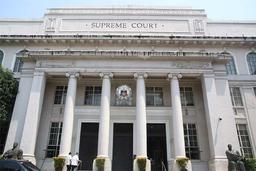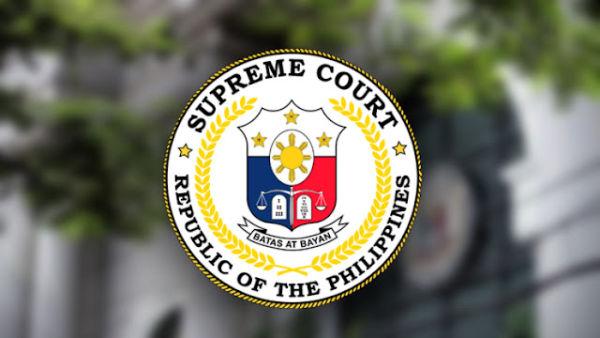
Q2_LESSON 1: PHILIPPINE JUDICIARY
Quiz by DARYL FAUSTINO
Feel free to use or edit a copy
includes Teacher and Student dashboards
Measure skillsfrom any curriculum
Tag the questions with any skills you have. Your dashboard will track each student's mastery of each skill.
- edit the questions
- save a copy for later
- start a class game
- automatically assign follow-up activities based on students’ scores
- assign as homework
- share a link with colleagues
- print as a bubble sheet
- Q1
Which of the following are true about the Supreme Court of the Philippines;
I. One of the scopes of the Judicial Power is to interpret the law and make them binding judgments.
II. Constitutionality of laws can be subject for judicial review.
III. The Supreme Court can create and pass resolutions or laws after the issuance of the TRO to suspend implementation of the latter due to unconstitutionality.
IV. The Supreme Court is the highest court of the land and regarded as the final decision maker.
I-II-III
I-II-IV
II-III-IV
I-II-III-IV
60s - Q2
The scope of judicial power which is intended to settle actual controversies involving rights and to determine whether there has been a grave abuse of discretion to lack or excess of jurisdiction.
Judicial Review
Adjudicatory Power
Incidental Power
Oversight Functions
60s - Q3
When the Supreme Court of the Philippines after granting a petition interprets a law and made binding judgments including its constitutionality, the court is practicing what kind of judicial power?
Incidental Power
Oversight Functions
Adjudicatory Power
Judicial Review
60s - Q4
Which of the following is not true about the Supreme Court of the Philippines?
The Judiciary in shall enjoy fiscal autonomy.
The Supreme Court shall have power in all cases in which the jurisdiction of any lower court is in issue.
Exercise original jurisdiction over cases affecting ambassadors, other public ministers and consuls, and over petitions for certiorari, prohibition, mandamus, quo warranto, and habeas corpus.
The Supreme Court shall be composed of a Chief Justice and fifteen Associate Justices.
60s - Q5
CLASSES OF COURTS
Users sort answers between categoriesSorting60s - Q6
STATUTORY COURTS
Users sort answers between categoriesSorting60s - Q7
Which of the following process cannot be acted by the Supreme Court?
All criminal cases in which the penalty imposed is reclusion perpetua or higher.
All cases of impeachment intended for government officials such as the President, Vice President, Members of the Constitutional Commission and Ombudsman.
All cases in which the jurisdiction of any lower court is in issue.
All cases involving the legality of any tax, impost, assessment, or toll, or any penalty imposed in relation thereto.
60s - Q8
This special court was established to decide on criminal and civil cases against government officials and employees who have been involved in crimes/ violations against Republic Act no. 3019 or the Anti-Graft and Corrupt Practices Act and other similar cases.
Regional Trial Court
Sandiganbayan
Court of Appeals
Ombudsman
60s - Q9
The following are quasi-judicial agencies except for;
60s - Q10
A special civil action requesting a lower court or body to transmit records to the superior court for the purpose of review.
Quo Warranto
Mandamus
Prohibition
Certiorari
60s - Q11
A writ by which the superior court prohibits the lower courts or body to stop further proceedings.
Mandamus
Prohibition
Certiorari
Quo Warranto
60s - Q12
An order made by a superior court to a lower court to perform a certain act which is bound to do so.
Certiorari
Quo Warranto
Mandamus
Prohibition
60s - Q13
An action made by the government to recover an office or franchise from an individual for unlawfully holding it.
Prohibition
Certiorari
Quo Warranto
Mandamus
60s - Q14
All cases involving the constitutionality of a treaty, international or executive agreement, or law, which shall be heard by the Supreme Court en banc, and all other cases which under the Rules of Court are required to be heard en banc, including those involving the constitutionality, application, or operation of presidential decrees, proclamations, orders, instructions, ordinances, and other regulations, shall be decided with the concurrence of a majority of the Members who actually took part in the deliberations on the issues in the case and voted thereon.
truefalseTrue or False60s - Q15
The Supreme Court appoints all its officials and employees with the rules and regulations exclusive for the Philippine Judiciary.
falsetrueTrue or False60s
